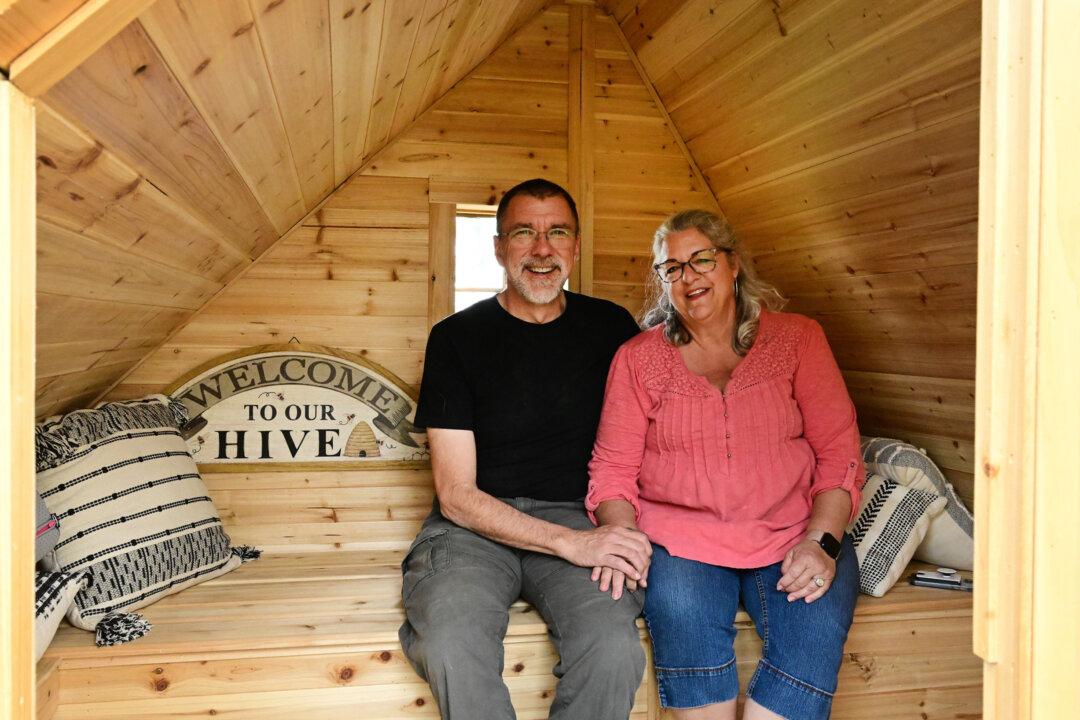Denver—Reclining on a bench in a wooden hut mere inches above thousands of humming honeybees in four active hives might sound like a frightening experience to some. It seems to have the opposite effect on guests who spend time in the “bee huts” at the Capella Ranch in Lafayette.
There is nothing to fear because, while the hum of the bees and the aroma of fresh honey can waft into the hut’s interior through slats in the bench, the bees are kept out by screen mesh. Most guests find their visits relaxing, and some report more profound effects.
When Kari Tewalt had her first bee hut experience there this week, she was entranced by the sound of the bees, noticing it had a “meditative” effect on her. She also felt what she called a “magnetic field,” a head-to-toe sensation akin to goosebumps.
“It’s a sensation almost like an energy flow,” said Tewalt, 48, a Broomfield resident who enjoyed her session so much she made reservations for a return visit next week with her daughter. “It’s almost in the realm of where you get the chills. It was just a brief wave that happened throughout my entire body. And it happened a few times through the session.”
Proponents of apitherapy—an ancient practice and alternative medicine based on the supposed benefits of bee products—say inhaling the aerosol emitted by bee hives offers benefits that include sensations of positive energy, boosts to immune systems, stress reduction, and a general sense of wellbeing.
But proprietors Carolyn and Charlie Peterson stop short of making those kinds of claims. “The medical side of it, we are wary of,” Carolyn said. “We don’t want to make any sort of guarantees. The claims that we’ve read go all over the place.”
Still, something unusual seems to be happening in those huts, which recently opened after a six-week soft opening last summer. They are about the size of a walk-in closet and are lined with fragrant cedar wood. There are pillows, two small windows, and visitors can lie down or sit.
“I have had over 100 people come through,” Carolyn said. “Everybody had a slightly different experience, but nobody came out feeling nothing. There’s a relaxation, a humming and vibration. It’s at a frequency that is supposed to be very soothing to your parasympathetic system. I was thinking that was strange. I actually can feel it. There’s a nice little tingle you get.”
Marsha Ruggeri, a nurse who lives in Lafayette, said she believes her sessions have improved her asthma, but that’s not the only reason she goes.
“My experience has been kind of exponential,” said Ruggeri, 64. “The first time I tried it, I thought, ‘This is really cool.’ The second time, I got a little more from the experience. The third time, it really hit me. I felt like I could hear the bees, I could hear the fluttering of their wings as they were drying the honey.”
Ruggeri described the experience as transcendental, similar to the feeling she gets from meditation and yoga.
“I feel like my mind is a little bit separate from my body,” Ruggeri said. “I usually have my eyes closed, but I can visualize the bees working. It’s like the bees have the ultimate social contract. Everything they’re doing is for an end goal. It’s not about them. They’re protecting the queen, producing the honey, going out and gathering (pollen and nectar). It seems very purpose-driven, and I kind of like that. I try to think about how I can focus like that.”
The Petersons moved from Superior to their small farm about five miles northeast of Boulder six years ago. Charlie soon became interested by beekeeping, first for ecological reasons, because honeybees face threats caused by parasitic mites, extreme weather events, and pesticides. According to a study by researchers at Penn State University, 43 percent of the honeybee colonies in the U.S. were lost between April 2019 and April 2020. That threatens agriculture, because one-third of the food eaten by Americans is pollinated by honeybees.
“The more I learned about them, the more I was just kind of hooked, because it’s like bees are magic,” Charlie said. “They provide food for human beings, and the way they manage their own colonies and take care of themselves, it’s just fascinating to watch. There’s just so much that’s good about them, whether it’s just the calm and sense of well-being you get when you are around them. From what we’ve heard, beekeepers live longer. At least that’s the conventional wisdom. You get vitamins, minerals, antioxidants coming off the beehive (when) you inhale it. You can actually breathe it in.”
Now Charlie is involved in honeybee “swarm rescue.” When a hive gets too crowded, a new queen takes over and the old queen leaves, taking 10,000 bees with her.
“She needs to go find someplace to live with all of her friends,” Charlie said. “If they are not rescued—picked up by a honeybee keeper, or something like that—they could be exterminated. Or they might choose the underside of the eaves of your house as a great place to live.”
This is the time of year when swarm activity happens. The Colorado State Beekeepers Association maintains a telephone hotline (844-SPY-BEES) which folks can call if they see a swarm without a hive, and Charlie is one of the volunteers who rescues swarms when they are reported. He heads out with a ladder, a five-gallon bucket and a bankers box.
“When bees land, they’ll come over to a tree branch and the queen will land on the branch,” Charlie said. “The bees will start coming around her, and that ball gets heavier and heavier. You see that big ball of bees, they are all protecting her. If I’ve gotten the call, I will walk up with a big box, put it right underneath them and shake the branch once. They drop into the box and I set it on the ground. As long as I see all the other bees going into it, I know the queen is in the box because they will follow her. Once they’re in there, around the queen, they’re happy.”
Both of Capella Ranch’s two bee huts contain four hives, and Charlie has other hives elsewhere. Inspired by beehive therapy locations in Europe, Charlie hired a shed builder to make the huts to his specifications last year. The Petersons know of only two other bee therapy huts in the U.S., one in Georgia, the other in Michigan.
The Petersons concede that apitherapy and the claimed meditative benefits of bee huts invite skepticism. “The connection to Boulder is not lost on us,” Charlie said with amusement. But, he bought a device that measures particulate matter in air, and it seemed to confirm the presence of pollen wafting in the huts. And, maybe there really is an energy field in there.
“We have heard that there is kind of an energy that people get,” Charlie said. “I’m thinking, ‘All right, really? This is getting a little out there, but let’s see if we can measure that.’ I picked up an electromagnetic measuring device. I’ll be darned, there’s actually a little spike in measurable electricity.”
Claims of energy fields and inhalable bee therapy aside, Carolyn says she’s heard people describe the experience as having a guided meditation session without having anybody talking to them.
“You can say, ‘Wow, these people are really nuts,’ while you’re laying down,” Carolyn said. “But, the thing that everybody tells me is, ‘Lay down and focus on the sound of the bees. The rest just sort of takes care of itself.'”






